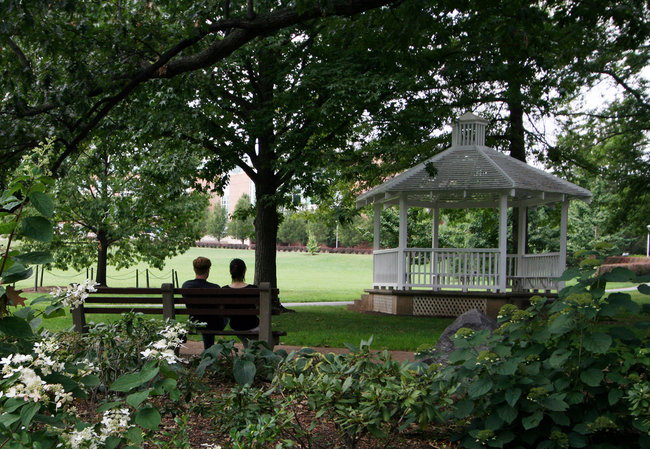Oh Lord, how I loved him. Remember that night? That glorious night when we sat out on the picnic table, staring up into the indigo sky, watching stars and talking about life and love and God? I walked back to my place at 2 o’clock in the morning pleading with God, “Please let me marry James. Please let me marry him. Or if not him then someone exactly like him.”

James and I spent every spare moment together. We ate together, hung out with friends together, walked the campus together, spent late nights swinging on play sets together and talking. We were for all intents and purposes, a couple, but with just one catch: we weren’t actually dating.
You see, nowhere along the line had either of us defined our relationship. At no point had we talked about being boyfriend or girlfriend. We just sort of slid into our time together and I, for my part, got swallowed up.
As it turns out, James and I, are not the only ones who have engaged in this delicate dance of dating without dating, committing without actual commitment. In their 2011 study, Amber Vennum and Frank D. Fincham, say that this sort of ambiguity in relationships is a marker for this generation of young adults. Somewhere along the line, the pre-existing milestones of courting, dating, falling in love, engagement and marriage, have just sort of faded into a blur of watercolors. As they put it, the ways in which twenty-somethings engage relationships no longer has any “clear, universal progression.” As it turns out, most couples report that their relationships just sort of “happened.”
How many of us have landed in these sorts of romances? Ended up giving more to someone physically, emotionally, financially, psychologically than we ever intended?
In this same way, Venuum and Fincham say that sliding into relationships will never be as satisfying as actively deciding to commit to a relationship. The reason being that when we sort of fluidly move into major transitions, we up the ante. We create a structure around that relationship that may or may not match our level of dedication to one another.
Perhaps we can see the glaring weaknesses of this type of relationship. We’re staying together for all the wrong reasons. In the end, the circumstances of our attachment have very little to do with the actual dedication we may feel. We may feel pressured to stay together because we’ve rented a place with our significant other, we’ve given them more physically then we intended, they’ve met our parents, or perhaps because we’re worried about being alone. On the other hand, dedication means we want to stay in a relationship for the sake of the relationship, not for the sake of event-driven reasons.
This can be tricky when one person wants dedication, while the other is happy to just slide. Ultimately, that’s what happened with James and I. While our relationship was rich with ambiguity, it was also rich with anxiety.
Because we had never buttoned down the boundaries of our friendship, and the exact expectations of where things were going, I was wrought with insecurity around the relationship.
Finally, after four months, I confronted him. What was going on with us? I asked. Were we dating? Were we exclusive? Where was all this flirtation, and intimacy building going?
His response?
He was keeping the proverbial fire going under a pot. He had lots of pots on the stove and he was waiting to see which pot started boiling.
No. I countered. I wasn’t willing to be just another option in his rotation of relationships. It was either date me, or drop me. No mean in between. Really, his choice was over. I had already made it for him. At that point, I wasn’t interested in hearing what or whom he would choose. I walked away—devastated, but with my pride intact.
A couple years later, a mutual friend told me that James sung my praises, that he held me high on a pedestal. I was stunned to hear this. Apparently, he told her that he had been so confused about relationships until I called him out.
As it turns out, though it had broken my heart to walk away from James, and though I had not ultimately won his love and commitment, in the end, I won his respect, and helped define for both of us healthy expectations for an intentional relationship.
Photo credit: Penn State